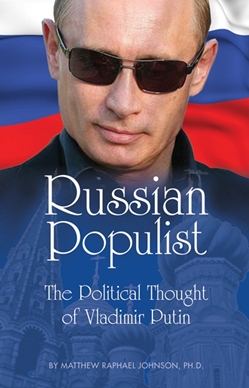Description
Russian president Vladimir Putin is one of the most reviled politicians in the West. At the same time, few leaders worldwide have maintained such high levels of popularity. Putin’s political and economic successes are too startling to be ignored. From his appointment as vice president on New Year’s Eve 1999, Putin has assisted in the rebuilding of a shattered country in a few short years. With high rates of economic growth, military and police reform, and a concerted attack on official corruption, Putin has become a trusted populist leader and a significant figure in global nationalism, non-alignment and multipolarity. This book attempts to synthesize the basic political views of Putin. It does not deal much with policy, but rather, it centers on the ideas that drive Putin and his reform plans in both domestic and foreign policy.
A new book has emerged from Dr. Matthew Raphael Johnson, former editor of THE BARNES REVIEW Revisionist history journal that explains why nationalists across the globe are calling Russian President Vladimir Putin “The Russian Populist.” Dr. Johnson, an acknowledged expert on Russian and Slavic studies, tells us exactly what makes Vladimir Putin tick in his new book Russian Populist: The Political Thought of Vladimir Putin.
From Putin’s rise to political power, through his crushing of the “Oligarchs,” and up to today’s frequent clashes with Western meddlers, Johnson lays out the policies that Putin has put in place to restore Russia to the glory days of old.
While the mainstream media portrays Putin as a hardline Bolshevik in wolf’s clothing, Johnson shows how Putin’s many agrarian, industrial, social and financial reforms—almost invariably implemented for the benefit of the future of Russia—reveal Putin’s true motives. He has in fact garnered such hostility from the United States simply because he has managed to do what the U.S. has not: create powerful economic alliances outside the control of the New World Order.
Softcover, 178 pages






